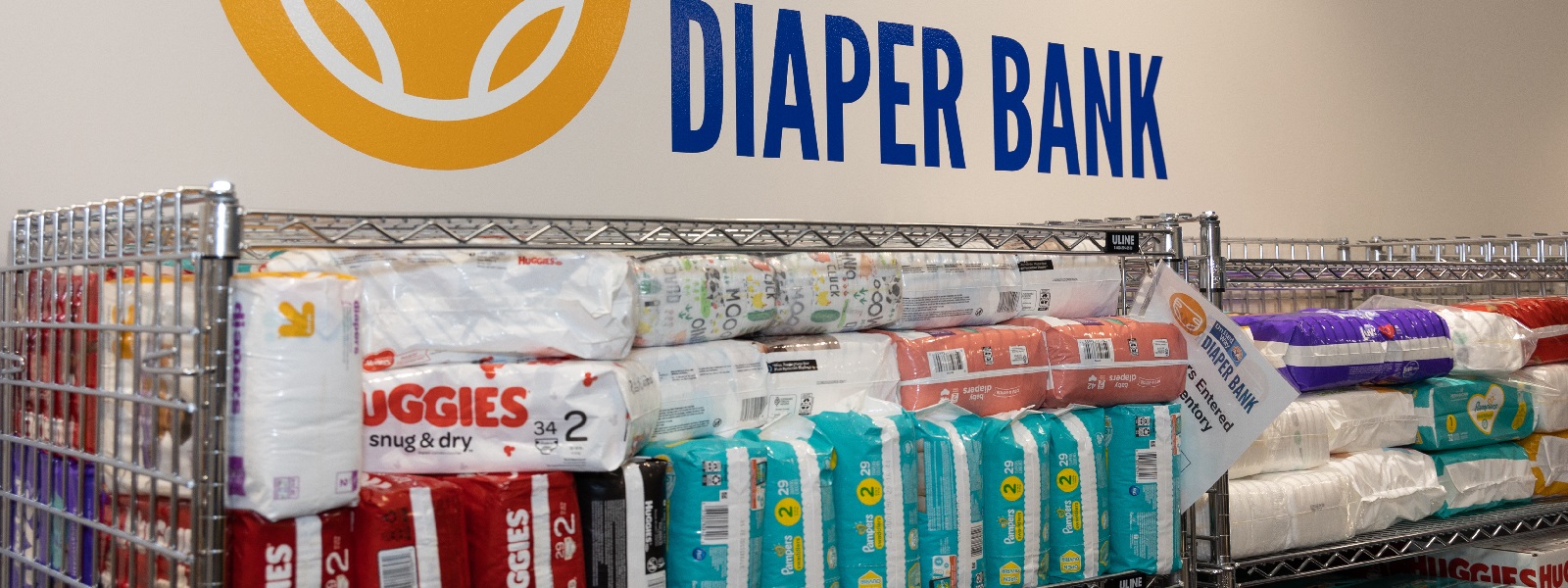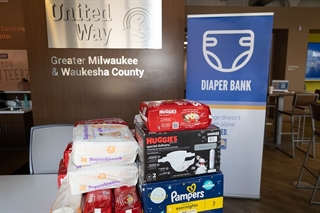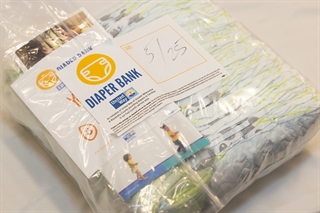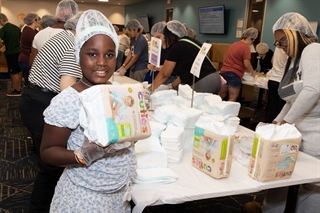A Discussion with Our Diaper Hubs

March 19, 2024
United Way’s Diaper Hubs distribute diapers to families in need. Learn how hubs in Milwaukee, Waukesha, and Ozaukee counties are helped by the Diaper Bank, and be inspired to join this mission.
Children bring joy, wonder, and laughter to homes. Their curiosity is infectious, their questions seemingly endless, and their smiles are abundant. While a parent beams with pride at their baby or toddler, deep down, they may be worrying, “How can I afford to keep them happy and healthy?”
Any parent will tell you that diapers are expensive, but some parents struggle to not only afford diapers, but to ask for help. Families throughout the nation are in need of diapers and hygiene items for their children, and the need is great. United Way of Greater Milwaukee & Waukesha County’s Diaper Bank looks to fill this need by supplying diapers to our fourteen Diaper Hubs throughout Milwaukee, Waukesha, southern Ozaukee, and southern Washington counties. We are dedicated to serving these hubs and we’re proud to additionally partner with over 32 agencies and organizations to serve as many families as we can.
“A mom was completely out of diapers that she needed, and her local diaper hub was closed,” said Tenia Ruffin, the office manager at African American Breastfeeding Network in Milwaukee. “We had her size, and she was just so grateful. She was in Kenosha, but she was just so grateful that she drove to us and got the diapers that she needed.”
With one in two families in the U.S. struggling to afford diapers, it’s not a question of when they can change a soiled diaper, but if they can. It also affects a parent’s ability to work, as 57% of parents nationally reported that they missed four days of work each month because they couldn’t afford the diapers to send their children to childcare, according to the National Diaper Bank Network.
“It’s an expensive supply that all babies need,” Michael Egly, Director of Program Services at the Waukesha Food Pantry said. “We had almost 1,100 children served in January.”
Locally, United Way has seen the request for diapers from our Diaper Hubs rise, and they sometimes run out of diapers faster than we can supply them. That doesn’t stop us from working to make sure orders are filled, however.
“Just yesterday, volunteers were saying, ‘We’re really low on diapers,’” Michael recalled. “And as I was being told this, I saw the United Way van pull into our parking lot and deliver diapers. It’s a real positive thing where even our volunteers and our clients are noticing the supply coming in.”
 “We have seen an increase in the requests that we get weekly. I get calls daily,” noted Tenia. “That number will always keep increasing, and then of course with the cost of living rising, it makes it more difficult. But we’re here to help and to do what we can in the community.”
“We have seen an increase in the requests that we get weekly. I get calls daily,” noted Tenia. “That number will always keep increasing, and then of course with the cost of living rising, it makes it more difficult. But we’re here to help and to do what we can in the community.”
On average, children require at least 50 diaper changes per week. When parents have to make the decision between clean diapers and other needs – like housing, food, or medical expenses – their children are more vulnerable to rashes, urinary tract infections, and other medical needs. It creates an expensive cycle that families can’t afford. When parents can’t send their children to early childhood education due to a lack of diapers, the children miss out on critical educational development. According to the National Diaper Bank Network, students that participate in early childhood education are 2.5 times more likely to go on to higher education. Children living in poor and low-income families are at the greatest risk.
“Many of our clients face a variety of challenges,” said Lisa Holtebeck, MSW, APSW Executive Director of Ozaukee Family Services. “Diapers are expensive and receiving them can reduce some of their financial concerns by freeing up money for rent or other household necessities. By reducing this stressor, our clients can focus their energy in other areas such as addressing behavioral or mental health issues.”
The success of United Way’s Diaper Bank has been an important part of our community. Tenia recalled support that the African American Breastfeeding Network was able to provide to two, young mothers shortly after the organization became a Diaper Hub.
“We had a meet and greet with our new doulas, and we were able to give out supplies as well as diapers at this event,” she said. “And there were people walking past and they peaked in. It just so happened that there were two women from the shelter next door to us. One had just had a baby four days prior and the other was expecting a baby and had a little one with her as well. We were able to give them diapers and serve them. And not only did we serve them via diapers, but the boxes that the diapers came in! We were able to give those boxes to them because they were going to be moving out of the shelter into more permanent housing. That extra help, even though it wasn't diaper related, we were still able to help using United Way.”
This positive impact is felt by everyone involved in the Diaper Bank, from the staff and volunteers at United Way and our hubs, to the parents receiving diapers. You can help our hubs continue to provide diapers for families in need. $25 supports diaper needs for one child for one week. Give to the Diaper Bank today and keep children in Milwaukee, Waukesha, southern Ozaukee, and southern Washington counties happy and healthy. You can also run a diaper drive or volunteer with your team to pack diapers for our hubs to distribute to families in need.
“We have an annual event, ‘Lift Up Every Baby,’ and last year we had 100 diapers for the families in the community and it was the most amazing thing,” Tenia said. “This year we’re going to set aside more diapers. United Way has been a great partner to make us successful in our community. Not only have they provided diapers for us, but they provided gift bags of supplies like bottle brushes, bottles, wipes…it was just so helpful and just so appreciative. We were able to offer that to our moms who are expecting or who have already given birth. There are not enough good words I can say about United Way.”
Thank you to the African American Breastfeeding Network, the Waukesha Food Pantry, Ozaukee Family Services, and all of our Diaper Hubs who Live United and help our community!
Interested in volunteering with United Way as an individual or as group?
Click here to get involved.
For more updates on United Way initiatives, follow us on Facebook, X, Instagram, and LinkedIN.
